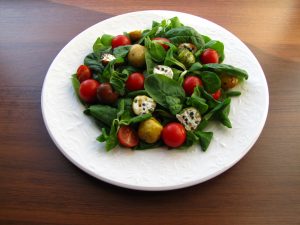Group of scientists at Kaunas University of Technology (KTU) Faculty of Chemical Technology created edible beads produced from natural components. Due to their altered structure the beads are suitable for people with swallowing disorders.
Edible beads, the molecular gastronomy product created at KTU, are covered with colourful edible film, which locks all the smells inside and does not reveal the taste of the bead. Various fillings of beads are created using special technologies.
“Our idea was to create a visually attractive product of altered structure, which could be used by people with swallowing disorders. The product can be designed according to the needs of the user, it can be of meat, fish, vegetable, grains or any other taste, and of various nutritional value”, says Milda Keršienė, KTU researcher.
Edible beads’ composition is based on cheese, and the idea was conceived by Marius Užupis, KTU food technologies student.
Molecular gastronomy is a subdiscipline of food science, aiming to explore and explain the transformations of ingredients that occur during cooking. While preparing this kind of food unusual physical and chemical processes are taking place and unconventional combinations of taste and appearance are discovered, which can surprise even experienced gourmands. Popularity of molecular gastronomy is growing exponentially and its products and dishes are being served in best restaurants of the world.

The impulse behind KTU’s innovation was meeting and further cooperation with British multi award-winning international celebrity chef Alan Coxon. While delivering a talk in a conference FOODBALT2018 organised by KTU, Coxon challenged the audience to create a product, which would include alegar, beer vinegar created by him according to the ancient recipe.
The celebrity chef not only rated the final KTU product as excellent, but also introduced it in Paris during the international food congress SIAL Paris 2018. At the moment, discussions with French cheese producers and specialists are taking place. It is expected to introduce the edible beads into the international market.
“In the 21st century it is very difficult to create something that people haven’t tasted yet. However, to use molecular gastronomy technologies in order to challenge familiar taste is a great way to acquire originality. People are always charmed by surprises, and molecular gastronomy products are akin to art; their full flavour is revealed only after tasting. Creating intrigue is very important nowadays as the choice of restaurants and eating places is immense”, says Užupis, the creator of the edible beads, KTU student.
According to him, when offered to try unusually looking and tasting products, people are reacting differently – some of them are very eager to try at once and some need more convincing.
KTU scientists agree that as the future of food science is personalised nutrition, the popularity of molecular gastronomy will grow further. KTU is the only university in Lithuania, which is offering molecular gastronomy course to its food technology students. During the course the students have an opportunity to create their own molecular gastronomy product, which, in addition to having exceptional sensual and textural qualities would also fulfill the personalised nutritional needs.